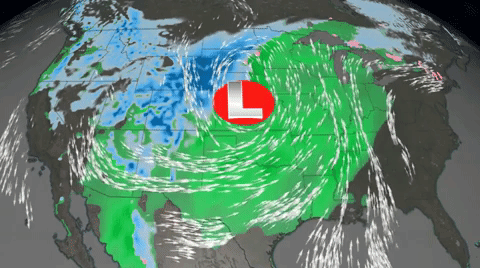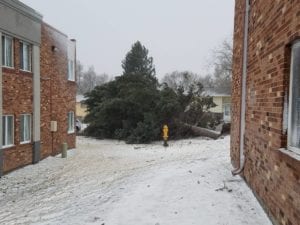Yes, “bomb cyclone” really is the technical term for the winter storm bearing down on the central U.S. today.
“What makes a storm a ‘bomb’ is how fast the atmospheric pressure falls,” explains New York Times science reporter Henry Fountain. “Deep drops in barometric pressure occur when a region of warm air meets one of cold air. The air starts to move, and the rotation of the earth creates a cyclonic effect.” This effect is called “bombogenesis.”
To give you a clearer picture of what that looks like: “The current pressure in the storm is equivalent to what you would typically find in a Category 1 hurricane,” said CNN Meteorologist Brandon Miller.
As a result, more than 70 million people in the central U.S. are bracing themselves for severe winds, snow, and potential flooding.
Here’s what you should be thinking about in terms of potential damages and homeowners insurance claims if your home is in the affected area.

How a Bomb Cyclone Could Affect Your Home
According to already feeling some of those effects. Here’s what they means for homeowners:
Hurricane-force wind gusts: “Hurricane-force” refers to winds that reach sustained speeds of more than 74 miles per hour.
Extreme winds can cause damage to homes through downed trees and poles, flying debris, and uprooted freestanding structures (like fences).
Blizzard conditions: “Blizzard conditions” include heavy or blowing snow, reduced visibility, and wind speeds of at least 35 miles per hour over a sustained time period.
Winter storms are the second biggest cause of homeowners insurance claims in the U.S., with damages occurring from falling tree limbs, weight of snow and ice on roofs, and wind-driven rain or hail.
Flood threats Flooding accounts for the third highest number of homeowners insurance claims in the U.S.
Water damage can affect foundations, basements, belongings within the house, cars parked on the property, and more.
Homeowners Insurance Covers Most of These Threats
It’s important to note that damage from flooding is not covered by homeowners insurance. You’ll only be able to file a flood-related claim if you have a flood insurance policy through the National Flood Insurance Program.
Besides flooding, a standard homeowners insurance policy covers most of the damages that could be caused by a bomb cyclone.
You’d be able to file a claim for damage due to falling branches or heavy snow on your roof, windows broken by flying debris, busting, frozen pipes, and so on.
See the Insurance Information Institute’s resource on filing a homeowners insurance claim after a catastrophe for more information.
Homeowners Can Take These Steps to Prepare
Make safety your first priority. The Red Cross offers helpful tips on safety and winter storm preparedness here.
Options for damage-proofing your home are fairly limited on the day of a storm. However, if the weather hasn’t quite reached you yet, there are a few steps you can take right now to reduce the likelihood of winter-storm related damage:
- Remove loose objects and debris from your yard or driveway
- Make sure freestanding objects in the immediate vicinity are tightly secured
- Park your car in the garage if possible
- Run your hot water periodically or let it drip to keep pipes from freezing
- Keep your attic cold by checking for cracks and sealing them up
- If you have time and are able to safely do so, clear your gutters and/or your roof before new snow accumulates
More Resources for Homeowners in the Central U.S.
If you need to file a homeowners insurance claim for wind- or snow-related damage, use this checklist from the Insurance Information Institute as a guide.
If you need to file a flood insurance claim, follow the steps in this brochure from the Insurance Information Institute.
Before you file a claim, see this article for tips about successfully filing a homeowners insurance claim after a major disaster.
Protect yourself against future winter storms: See the Red Cross’s advice on winter storm preparedness, preventing frozen pipes, and safe backup generator use.

